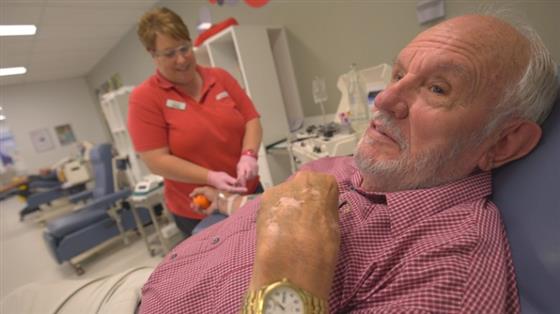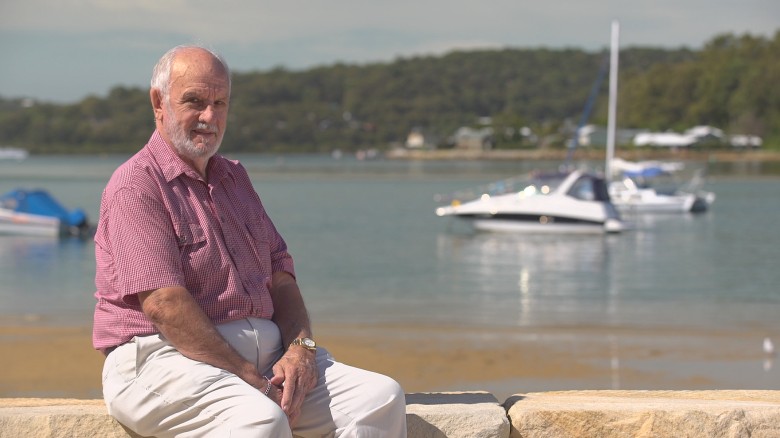
澳大利亚现年81岁的男子Harrison,过去60年每周坚持献血,帮助挽救了210万个生命。
81岁的澳大利亚老翁哈里森的血液带有罕有抗体,可制针药预防新生儿溶血症,他献血六十年至上周五“收手”,红十字会估计他共救了240万名婴儿。
新生儿溶血症是母胎的恒河猴(Rhesus)血型相斥而引起的敏感症,这种亦称为恒河猴疾病(Rhesus disease)的敏感症可致胎儿贫血、脑损伤甚至流产,在1960年代以前年夺澳澳大利亚数千胎儿生命,面对此问题的孕妇概率高逾17%。
哈里森(James Harrison)是遭逢大劫后得到此“异能",14岁时因肺病接受开胸大手术,获13人输血续命,血里自此带有Rh抗原,医生遂邀他执行特别任务,捐血浆提炼无法以人工制作的”Anti-D“针药,救助高危孕妇。
哈里斯21岁起每隔一周至数周捐血,60年来共计1100多次,捐得越密抗体也越多,自1967年以来炼制出300万剂Anti-D,受惠者包括亲女儿特蕾西和外孙。哈里斯说:”我救了很多人命,带了很多孩子到世上来,感觉非常好。“
1999年,哈里斯获得澳大利亚勳章嘉许,红十字会亦感谢他坚持多年,但他谦说:”捐血不过是我唯一的才能。“
(CNN)Most people, when they retire, get a gold watch. James Harrison deserves so much more than that.
Harrison, known as the "Man With the Golden Arm," has donated blood nearly every week for 60 years. After all those donations, the 81-year-old Australian man "retired" Friday. The occasion marked the end of a monumental chapter.
According to the Australian Red Cross Blood Service, he has helped saved the lives of more than 2.4 million Australian babies.
First, a note about antibodies
Harrison's blood has unique, disease-fighting antibodies that have been used to develop an injection called Anti-D, which helps fight against rhesus disease.
This disease is a condition where a pregnant woman's blood actually starts attacking her unborn baby's blood cells. In the worst cases, it can result in brain damage, or death, for the babies.
Here's why:
The condition develops when a pregnant woman has rhesus-negative blood (RhD negative) and the baby in her womb has rhesus-positive blood (RhD positive), inherited from its father.
If the mother has been sensitized to rhesus-positive blood, usually during a previous pregnancy with an rhesus-positive baby, she may produce antibodies that destroy the baby's "foreign" blood cells. That could be deadly for the baby.
How Harrison made a difference

Harrison's remarkable gift of giving started when he had major chest surgery when he was just 14, the Australian Red Cross Blood Service said.
Blood donations saved his life, so he pledged to become a blood donor.
A few years later, doctors discovered his blood contained the antibody which could be used to create Anti-D injections, so he switched over to making blood plasma donations to help as many people as possible.
Doctors aren't exactly sure why Harrison has this rare blood type, but they think it might be from the transfusions he received when he was 14, after his surgery. He's one of no more than 50 people in Australia known to have the antibodies, the blood service says.
"Every bag of blood is precious, but James' blood is particularly extraordinary. His blood is actually used to make a life-saving medication, given to moms whose blood is at risk of attacking their unborn babies. Every batch of Anti-D that has ever been made in Australia has come from James' blood." Falkenmire said. "And more than 17% of women in Australia are at risk, so James has helped save a lot of lives."
Why his donations were a game changer
Anti-D, produced with Harrison's antibodies, prevents women with rhesus-negative blood from developing RhD antibodies during pregnancy. More than three million does of Anti-D have been issued to Australian mothers with negative blood types since 1967.
Even Harrison's own daughter was given the Anti-D vaccine.
"That resulted in my second grandson being born healthy," Harrison said. "And that makes you feel good yourself that you saved a life there, and you saved many more and that's great.
The discovery of Harrison's antibodies was an absolute game changer, Australian officials said.
"In Australia, up until about 1967, there were literally thousands of babies dying each year, doctors didn't know why, and it was awful. Women were having numerous miscarriages and babies were being born with brain damage," Jemma Falkenmire, of the Australian Red Cross Blood Service, told CNN in 2015. "Australia was one of the first countries to discover a blood donor with this antibody, so it was quite revolutionary at the time."
Why he's a national hero
That would be more than two million lives, according to the blood service, and for that Harrison is considered a national hero in Australia. He's won numerous awards for his generosity, including the Medal of the Order of Australia, one of the country's most prestigious honors.
"It becomes quite humbling when they say, 'oh you've done this or you've done that or you're a hero,'" Harrison said. "It's something I can do. It's one of my talents, probably my only talent, is that I can be a blood donor."
Now that Harrison has given his last blood donation (in Australia you can't donate blood past the age of 81), Falkenmire and others hope people with similar antibodies in their blood will step up and donate.
"All we can do is hope there will be people out there generous enough to do it, and selflessly in the way he's done," she said.
